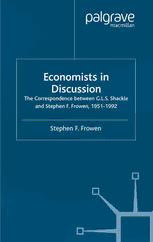
Economists in Discussion: The Correspondence Between G.L.S. Shackle and Stephen F. Frowen, 1951–1992 PDF
Preview Economists in Discussion: The Correspondence Between G.L.S. Shackle and Stephen F. Frowen, 1951–1992
Economists in Discussion Economists in Discussion The Correspondence between G.L.S. Shackle and Stephen F. Frowen, 1951–1992 Stephen F. Frowen © Stephen F. Frowen and the estate of Catherine Shackle 2004 Softcover reprint of the hardcover 1st edition 2004 978-0-333-77208-9 All rights reserved. No reproduction, copy or transmission of this publication may be made without written permission. No paragraph of this publication may be reproduced, copied or transmitted save with written permission or in accordance with the provisions of the Copyright, Designs and Patents Act 1988, or under the terms of any licence permitting limited copying issued by the Copyright Licensing Agency, 90 Tottenham Court Road, London W1T 4LP. Any person who does any unauthorised act in relation to this publication may be liable to criminal prosecution and civil claims for damages. The author has asserted his right to be identified as the author of this work in accordance with the Copyright, Designs and Patents Act 1988. First published 2004 by PALGRAVE MACMILLAN Houndmills, Basingstoke, Hampshire RG21 6XS and 175 Fifth Avenue, New York, N. Y. 10010 Companies and representatives throughout the world. PALGRAVE MACMILLAN is the global academic imprint of the Palgrave Macmillan division of St. Martin’s Press, LLC and of Palgrave Macmillan Ltd. Macmillan® is a registered trademark in the United States, United Kingdom and other countries. Palgrave is a registered trademark in the European Union and other countries. ISBN 978-1-349-41558-8 ISBN 978-1-4039-3865-7 (eBook) DOI 10.1057/9781403938657 This book is printed on paper suitable for recycling and made from fully managed and sustained forest sources. A catalogue record for this book is available from the British Library. Library of Congress Cataloging-in-Publication Data Economists in discussion : the correspondence between G.L.S. Shackle and Stephen F. Frowen, 1951–1992 /c Stephen F. Frowen. p. cm. Includes bibliographical references and index. 1. Shackle, G.L.S. (George Lennox Sharman), 1903–1992—Correspondence. 2. Frowen, Stephen F. 1923––Correspondence. 3. Economists–Philosophy. 5. Decision making. 6. Economists–Great Britain–Biography. I. Frowen, Stephen F. II. Shackle, G.L.S. (George Lennox Sharman), 1903–1992 HB103.S47A4 2003 330.1’092’2–dc21 2003053269 10 9 8 7 6 5 4 3 2 1 13 12 11 10 09 08 07 06 05 04 This book is dedicated to the late George and Catherine Shackle in loving and eternal memory v Contents Acknowledgements ix Introduction xi THE LETTERS 1 Appendices 1 The Big Flake G.L.S Shackle 328 2 Reflections on George Shackle: Three Excerpts from the Shackle Collection 332 Stephen C. Littlechild 3 Obituary of G.L.S. Shackle 338 Stephen F. Frowen 4 In Memoriam: G.L.S. Shackle, FBA, 1903 to 1992 340 Stephen F. Frowen 5 Missing Letters Discovered in February 2004 among Papers Bequeathed by Catherine Shackle to Cambridge University Library 344 Name Index 363 Subject Index 368 vii Acknowledgements My chief debt is to G.L.S. Shackle’s wife Catherine Shackle, who has given me every encouragement to publish this volume. She died on 14 June 2003, just seven weeks after approving the Introduction to this correspon- dence in her letter of 26 April 2003. I had become her ‘Other-Brother’, and she became for me the sister I never had. It is my deepest wish to dedicate this volume to both the late George and Catherine Shackle. I am particularly grateful to Mr. T.M. (Tim) Farmiloe, who as Publishing Director of Macmillan originally accepted the correspondence for publica- tion shortly before his retirement. Our relationship over many of my books has been a very happy one and I am glad to say that our friendship grew with every new volume and continues to deepen. He also gave every encouragement in 1988 to the publication of my Festschrift, edited by Philip Arestis, Contemporary Issues in Money and Banking (second edition Money and Banking: Issues for the Twenty-First Century, 1993). I am glad to say that my collaboration with Ms. Amanda Watkins, Senior Commissioning Editor, Palgrave Macmillan, has also been very constructive and fruitful, and I wish to express my special thanks to her for taking over this project from Tim Farmiloe and see it through to its final completion. Her assistance and support cannot be praised enough. I must further express my gratitude to the past and present Keeper of Manuscripts at Cambridge University Library, Mr. A.E.B. Owen and Dr. Patrick Zutshi respectively, and their staff, in particular Ms. Kathleen Cann, the author of the ‘Catalogue of the Shackle Papers’, published in Economics as an Art of Thought (editors P.E. Earl and S.F. Frowen), pp. 368–418, and Mr. Godfrey Waller, Superintendent of the Manu- scripts Reading Room, for their unfailing assistance in tracing letters included in this volume. Thanks are also due to Professor Sir Brian Heap, Master of St. Edmund’s College, University of Cambridge, and to Dr. The Rev. Frank McHugh, the former Director of the Von Hügel Institute Cambridge, for their general support and interest in this endeavour, to my colleague at University College London, Professor Victoria Chick, for reading and commenting on parts of the book, to Ms. Anne Usher, the Departmental Administrator at UCL, for much assistance, and to Miss Joe Piris for typing a great part of the correspondence. Lastly, but with special emphasis, I would like to express my deepest thanks to Mr. Keith Povey, the copy-editor of this volume and many of my previous books. Our working relationship for nearly two decades has been most inspiring and I cannot recall any occasion when I did not take up his ix
